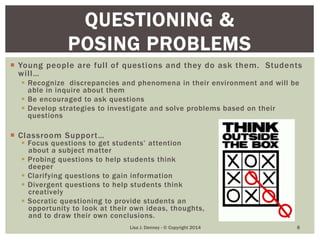Characteristics of Intelligent Behavior
- 1. CHARACTERISTICS OF INTELLIGENT BEHAVIOR Lisa J. Denney MED/560 Secondary Teaching Methods October 13, 2014 Scott Brewer Lisa J. Denney - © Copyright 2014 1
- 2. INTELLIGENT BEHAVIOR …i s h av i ng the ski l ls and abi l ities to select and execute at will the right behaviors to be ef fective with people and situations; it requires ef fective thinking, decision making and also ef fective fol low-through behaviors (Gaf fney, 2012, p.1) . Lisa J. Denney - © Copyright 2014 2
- 3. APPLICATION OF KNOWLEDGE Students wi l l apply school - learned knowledge to real - l ife s i t u at io ns by… Drawing on past knowledge Applying knowledge to new situations Recognizing problems Solving problems C l a s s ro om S u p p o r t… In Language Arts and Social Studies students will applying proofreading skills when writing essays, short stories, or peer editing. In math and Science, students will problem solve to find the answer to word problems. In Reading, students will apply previous knowledge to recognize a problem in a story and provide possible solutions for the problems. In all content area, students will use project -based learning. Lisa J. Denney - © Copyright 2014 3
- 4. CREATING, IMAGINING, & INNOVATING “I c an ’t ” i s n ot al l owe d an d s t ude n t s wi l l… Gain intrinsic motivation Understand constructive criticism Learn the value of positive feedback Learn “I can!” Cl as s ro om Suppo r t… In Language Arts and Reading, students will create posters, bookmarks, pamphlets, and so forth for their quarterly book projects; creative writing assignments. In Science, students will conduct research, create and design backboards to demonstrate their science projects. In Social Studies, students will create their own countries, complete with a map, resources, and culture. In math, students will create a new game based on the concepts they have learned about numbers. Lisa J. Denney - © Copyright 2014 4
- 5. UNDERSTANDING & EMPATHY …i s an imp or t ant s k i l l for c onfl i c t re s ol u tion. St u d e nt s wi l l… Gain an ability to listen to others Understand another’s viewpoint Broaden their own perspectives as they listen to the ideas and reactions of others. C l a s s ro om S u p p o r t… In all core subjects, cooperative learning activities that give students the opportunity to work with others, to listen to their peers, and problem-solve together. Think-pair-share activities to allow students to hear the reaction of others and understand another’s viewpoint. Lisa J. Denney - © Copyright 2014 5
- 6. IMPULSIVITY When students develop impulse control , they think before acting. St u d ent s wi l l… Think before shouting out an answer Study out a project or task before beginning it Consider insufficient data before making a conclusion C l a s s ro om s u p p o r t… Classroom management skills – teaching students to raise a hand before shouting out an answer Learning patience – waiting their turn Show of hands for all student who know the answer before calling on one student to share the answer Lisa J. Denney - © Copyright 2014 6
- 7. PERSISTENCE St ay i ng wi t h a t as k u nt i l i t i s c omp l eted. St u d ent s wi l l… Have an internal locus of control Persevere through formidable opposition Refuse to be intimidated by a task or situation C l a s s ro om S u p p o r t… Supporting a student until a task, assignment, or project is completed Break large assignments or projects into smaller tasks to as to keep student from feeling overwhelmed and also to experience success each step of the way Lisa J. Denney - © Copyright 2014 7
- 8. QUESTIONING & POSING PROBLEMS Young people are ful l of questions and they do ask them. Students wi l l… Recognize discrepancies and phenomena in their environment and will be able in inquire about them Be encouraged to ask questions Develop strategies to investigate and solve problems based on their questions Cl as s ro om Suppo r t… Focus questions to get students’ attention about a subject matter Probing questions to help students think deeper Clarifying questions to gain information Divergent questions to help students think creatively Socratic questioning to provide students an opportunity to look at their own ideas, thoughts, and to draw their own conclusions. Lisa J. Denney - © Copyright 2014 8
- 9. CONCLUSION When students can exercise self -control, empathize with others, work col laboratively and cooperatively, communication clearly, apply learned knowledge to a variety of situations, be creative, find humor, be persistent, wi l l ing to take risks, and open to new learning, they wi l l become successful, responsible and accountable learners (Kel lough & Kel lough, 2011) . Lisa J. Denney - © Copyright 2014 9
- 10. REFERENCES Gaf fney, D. (2012). Behavior intelligence def ined. Retrieved from http://www.behavioral-intel ligence.com/2012/03/11/behaviorial- intell igence-defined/ Kel lough, R. D. , & Kel lough, N. G. (2011). Secondary School Teaching: A Guide to Methods and Resources (4th ed. ) . Boston, MA: Al lyn & Bacon, Pearson Education. Lisa J. Denney - © Copyright 2014 10 Created By: Lisa J. Denney









